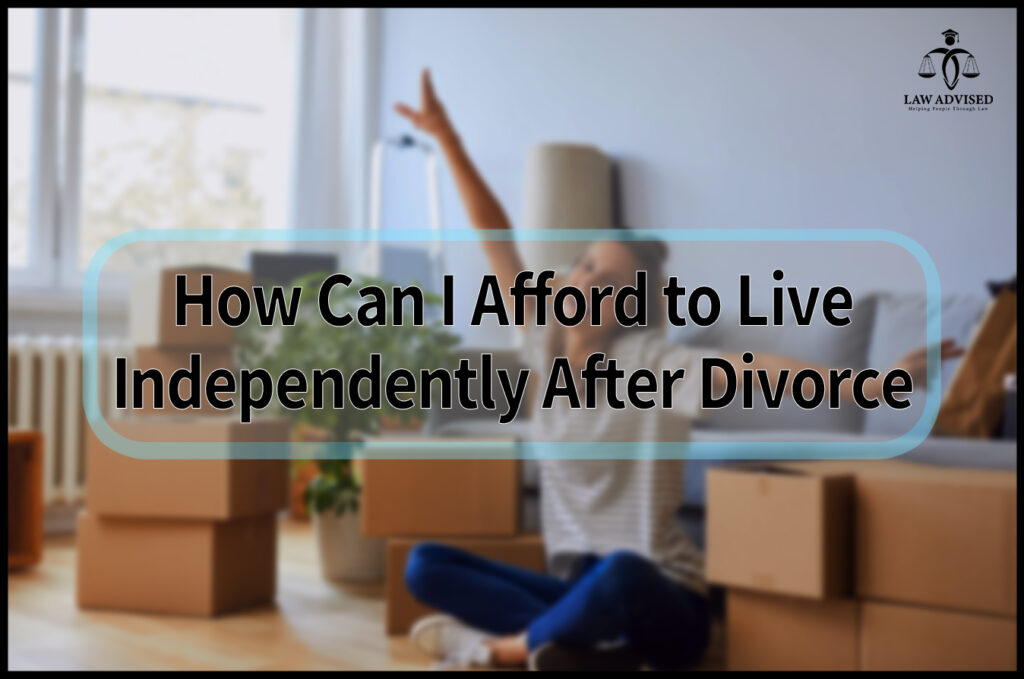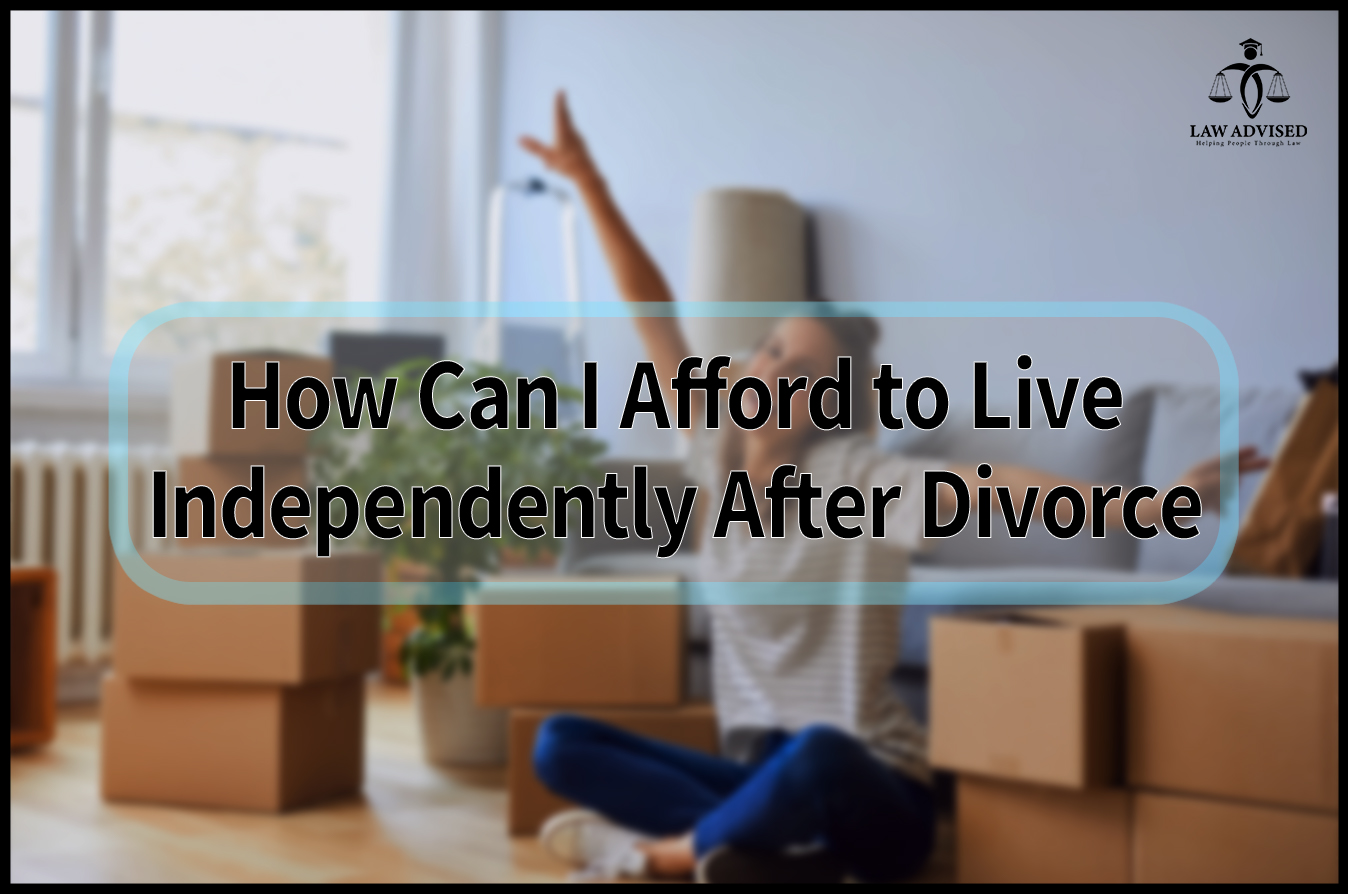After divorce, you can afford to live on your own by creating a budget and cutting expenses. Divorce can be a difficult and challenging time, both emotionally and financially.
One of the biggest concerns for individuals going through a divorce is how they can afford to live on their own after the split. It’s important to carefully assess your financial situation and create a budget that accounts for all of your expenses.
By cutting unnecessary expenses, such as dining out or subscription services, and finding ways to increase your income, such as taking on a second job or freelancing, you can take control of your financial future. In addition, exploring options for affordable housing and seeking financial assistance or guidance can provide valuable support during this transition. With a proactive approach and careful planning, you can successfully navigate the financial challenges of living on your own post-divorce.
Creating A Post-divorce Budget
Creating a post-divorce budget is crucial in order to afford to live on your own after a divorce. Assessing your financial situation is the first step to take. Begin by examining your income and expenses to determine where you stand financially. Identify your needs versus wants to prioritize your spending. It’s important to be realistic and practical.
Next, look for areas where you can potentially save money. Analyze your expenses and see if there are any unnecessary costs that can be cut back or eliminated. Adjusting your lifestyle may be necessary to stay within your means.
Setting realistic financial goals is also essential. Determine what you want to achieve financially and establish a plan to reach those goals. Whether it’s saving for an emergency fund, paying off debt, or investing for the future, having clear objectives will help you stay focused and motivated.
Reducing Living Expenses
One of the challenges of living on your own after a divorce is managing your finances effectively. Reducing living expenses can help stretch your budget and make it more manageable. Downsizing your living arrangements is a practical step to consider. Moving to a smaller, more affordable home or apartment can significantly cut down on your monthly expenses. Another way to save money is by decreasing utility costs.
Conserving energy, finding cheaper utility providers, and implementing energy-efficient practices can help reduce your bills. It’s also important to evaluate your subscriptions and memberships. Cancel unnecessary ones that are draining your finances. Additionally, you can save money on groceries and dining out by planning meals, shopping in bulk, and cooking at home more often. These strategies can provide you with some financial relief as you adjust to your new financial situation.
Maximizing Income And Assets
Living on your own after a divorce can be challenging, but there are several strategies you can employ to maximize your income and assets. Finding employment or increasing your income is a crucial step in achieving financial independence. Consider exploring investment opportunities to grow your wealth and create a more stable financial future.
Negotiating alimony and child support can also provide additional financial resources to support your independent lifestyle. Additionally, selling unwanted possessions can help you generate extra cash and declutter your living space. By implementing these strategies, you can afford to live on your own after a divorce and regain control of your financial situation.
Managing Debt And Credit
When going through a divorce, managing your debt and credit can be crucial for affording to live on your own. One option to consider is consolidating and refinancing loans. This allows you to combine multiple debts into one, potentially with a lower interest rate, making it easier to repay.
In addition to consolidation, developing a debt repayment plan can help you regain control of your finances. Start by tracking your expenses and identifying areas where you can cut back. Then, allocate any extra money toward paying off your debts.
Another important aspect of managing your finances is monitoring and improving your credit score. Regularly checking your credit report can help you catch any mistakes or fraudulent activity, which can negatively affect your score. Consider signing up for credit monitoring services to stay updated on any changes.
If you find yourself overwhelmed or unsure about managing your debt and credit, seeking professional financial advice can be a wise decision. A financial advisor can guide you through the process and provide customized strategies to help you get back on track financially.
Building A Strong Support Network
Building a strong support network is crucial when it comes to afford to live on your own after a divorce. By utilizing community resources and assistance programs, you can find the help you need to make ends meet. Consider sharing expenses with trusted individuals, such as roommates or family members, to help reduce the financial burden.
Joining support groups or online communities can provide both emotional and financial support, as you connect with others who are going through similar experiences. Additionally, seek help from your family and friends, who can offer guidance and assistance during this transition. By relying on your support network and utilizing the resources available to you, you can successfully transition to living on your own after a divorce.
Prioritizing Self-care And Well-being
When going through a divorce, it’s essential to prioritize self-care and well-being to navigate the challenges that may arise. Managing stress and maintaining mental health become crucial during this time. There are several budget-friendly ways to practice self-care without overspending. Engaging in free or low-cost hobbies and activities can help relieve stress and promote mental well-being.
Taking a walk in nature, practicing yoga, or meditating are all great options. You can also explore budget-friendly ways to stay active and healthy, such as exercising at home or utilizing free workout videos online. Prioritizing self-care doesn’t have to break the bank; instead, it can be achieved by being resourceful and finding activities that align with your budget and interests.
Long-term Financial Planning
To afford living on your own after a divorce, long-term financial planning is crucial. One important step is to create an emergency fund. Saving regularly and setting aside a portion of your income for unexpected expenses can provide a safety net and prevent you from going into debt. Another aspect of long-term financial planning is saving for retirement and future goals. Contributing to a retirement account as early as possible, such as a 401(k) or Individual Retirement Account (IRA), can help secure your financial future.
Additionally, consider investing in education or career advancement to increase your earning potential and open up more opportunities. Updating legal and financial documents is also essential to ensure that your assets, insurance, and beneficiaries are up to date and reflect your current circumstances. Taking these steps will give you a solid foundation for living independently and achieving financial stability after a divorce.
Frequently Asked Questions On How Can I Afford To Live On My Own After Divorce

How Can I Afford To Live On My Own After Divorce?
Divorce can significantly impact your finances, but there are steps you can take to afford to live on your own. Creating a budget, cutting unnecessary expenses, and seeking financial assistance are all helpful strategies. It’s important to prioritize your expenses and explore opportunities to increase your income.
Don’t hesitate to seek professional advice to navigate this new chapter in your life successfully.
What Are Some Ways To Create A Budget Post-Divorce?
Creating a budget post-divorce is crucial in managing your finances. Start by analyzing your income and expenses, including mortgage/rent, utilities, insurance, groceries, and transportation. Consider dividing your expenses into essential and non-essential categories, allowing you to allocate funds wisely. Trim discretionary spending wherever possible and explore affordable alternatives for essential services.
How Can I Cut Unnecessary Expenses After Divorce?
Cutting unnecessary expenses can free up funds to help you live on your own after divorce. Look for subscriptions or memberships you no longer need and cancel them. Consider downsizing to a smaller home or finding a more affordable living arrangement.
Reduce dining out opt for homemade meals, and shop for discounts or sales before making any purchases.
Are There Any Support Programs Available For Divorced Individuals?
Yes, there are support programs available for divorced individuals. Programs such as Temporary Assistance for Needy Families (TANF), Supplemental Nutrition Assistance Program (SNAP), and rental assistance can provide temporary financial help during this challenging transition. Research and reach out to local organizations or government agencies that offer assistance specific to your circumstances.
Should I Consider Increasing My Income After Divorce?
Increasing your income after divorce can alleviate financial stress. Explore career advancement opportunities at your current job or consider acquiring new skills through education or training programs. Alternatively, you may explore part-time work or freelancing opportunities to supplement your income.
Don’t hesitate to seek guidance from a career counselor or mentor to help you navigate your options.
What Steps Can I Take To Prioritize My Expenses Effectively?
Prioritizing your expenses is essential for managing your budget after divorce. Begin by identifying and addressing your most critical needs, including housing, utilities, healthcare, and debt payments. Once you’ve covered the essentials, allocate funds toward other necessary areas, such as transportation and groceries.
Avoid unnecessary expenses until you have a clear understanding of your financial stability.
How Do I Find Affordable Housing After Divorce?
Finding affordable housing after divorce may require some research and planning. Start by exploring rental options in your desired location or consider downsizing to a smaller, more affordable property. Utilize online platforms and resources that aggregate apartment listings or connect you to affordable housing programs in your area.
Additionally, consider reaching out to local housing authorities or organizations that assist individuals in finding affordable housing.
Where Can I Seek Professional Financial Advice After Divorce?
Seeking professional financial advice after divorce is a wise decision. Consult certified financial planners or divorce financial analysts who specialize in helping individuals navigate post-divorce financial challenges. Look for professionals with experience in divorce-related financial matters to guide you through budgeting, debt management, and investment strategies tailored to your circumstances.
Conclusion
Transitioning to living on your own after a divorce can feel overwhelming, but with careful planning and budgeting, it is possible to afford your own place. By prioritizing expenses, seeking assistance when needed, and exploring various income sources, you can create a realistic financial plan to support your independent lifestyle.
Remember, taking small steps and seeking support from friends, family, and professionals can make the process more manageable.
Ismail Hossain is the founder of Law Advised. He is an Divorce, Separation, marriage lawyer. Follow him.





Leave a Reply